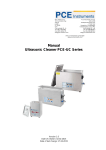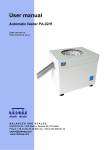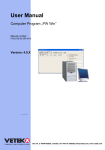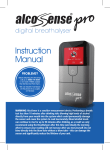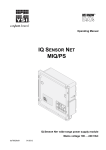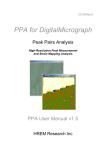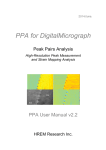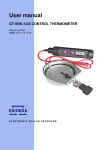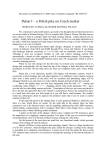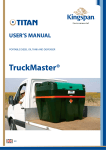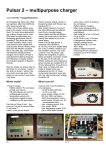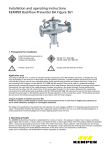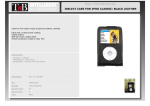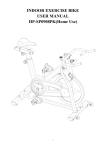Download Water vapour permeability test through leather with
Transcript
Water vapour permeability test through leather with application of moisture analyzer series MAC 50 Manufactured by RADWAG The aim of this publication is to present an alternative method for testing water vapour permeability with application of moisture analyzers. It is a new approach to this problem, which has been developed by Chair of Technology and tanning Shoes at Technical University in Radom and participated by RADWAG Testing Laboratory. New developed method shortens testing time, which is significant for potential users. Janas Sławomir Kierownik Laboratorium Badawczego e-mail: [email protected] RADWAG WAGI ELEKTRONICZNE – TESTING LABORATORY / TECHNICAL SUPPORT / 26-600 RADOM, 28 Bracka Street tel. +48 (0-48) 38 48 800 ext. 536 tel./fax. +48 (0-48) 385 00 10 http://www.radwag.pl CONTENT 1. Introduction.............................................................................................................................3 2. Sampler 2000 design...............................................................................................................3 3. Description of a method for water vapour permeability with application of moisture analyzers......................................................................................................................................4 3.1. Test conditions ............................................................................................................5 3.2. Devices and substances used for method processing..................................................5 3.3. Determination process – testing procedure.................................................................5 4. Sources of errors ...................................................................................................................12 4.1. Moisture analyzer......................................................................................................12 4.2. Sampler .....................................................................................................................12 4.3. Ambient conditions ...................................................................................................12 5. Reference methods................................................................................................................12 5.1. Water vapour permeability matching with method PN-74/P-22138 ........................12 5.2. Water vapour permeability matching with method PN-71/P-22150 ........................13 5.3. Water vapour permeability matching with method PN/EN ISO 14268....................14 5.4. Comparison tests for various kinds of leather...........................................................14 -2- 1. Introduction A set for testing water vapour permeability consists of two components. The first one is a sampler 2000, the other one is a moisture analyzer. The sampler is dedicated directly to moisture analyzers, and its application for other tests is not possible. A moisture analyzer is a standard instrument, and it can only be utilized as: A precision balance with specific readout precision An instrument for determination of moisture content /dry mass content/ in vvarious samples As the Sampler 2000 is installed in the moisture analyzer, it is possible to perform control process in which permeability of water vapour through various kinds of leather is tested. The procedure is clearly described in the latter part of the publication. A design including a moisture analyzer and sampler is a new developed technology for testing water vapour permeability. the method presented below does not require leather seasoning. Thus, it causes significant shortening testing procedure if compared to method no. PN-P-22138. As comparison tests, there have a series of tests performed for water vapour permeability through different kinds of leather. The tests were conducted in RADWAG Testing Laboratory and Chair of Technology and tanning Shoes at Technical University in Radom. 2. Sampler 2000 design A sampler is an aluminum device, that consists of a body, cover, sealing ring and another cover. If all components are connected, than the sampler is a leakproof construction, in which distilled water is evapourated. Measuring method and sampler design are legally protected by patents (sampler W 116646, measuring method P 381787) -3- 1- Body of a sampler /holds distilled water during testing procedure / 2- Expansion ring /causes sample seizure, when it is fitted to the sampler with large allowance / 3- Upper sampler pan /it is used only during so called zero test / 4- Sealing ring /it is used as a pressing element for samples with low thickness/ 5- Sampler cover /closure of sampler construction / 3. Description of a method for water vapour permeability with application of moisture analyzers. Water vapour permeability is precise measurement of mass decrement of water which evapourates from sampler interior through tested leather sample. Water vapour permeates through leather as result of its pressure increase, which is caused by increasing temperature inside the sampler. A testing device for permeability method is a moisture analyzer. It is designed from a precision balance with readability of 1 mg and a drying chamber with set of halogen lamps, temperature sensor and converting circuits with a digital display. Precision balance is to precisely determine mass in testing cycle. Electronic circuit through feedback from temperature sensor and halogen lamps maintains set temperature. Electronic components of a moisture analyzer process collected data and indicate results on moisture analyzer display. Data recording takes place automatically with no operator action, with set time interval. Data can be processed on: Personal computer with installed and active software PomiarWin. Printer Manually by making notes. The most convenient and recommended solution is a computer with installed software. Collected data are used for designing a graph from drying process. The graph indicates speed of water vapour permeation though testes leather sample, and speed of water evapouration in “zero” method. -4- The measure of water vapour permeability is quantity of water vapour, expressed in %, that permeates through a substance (leather), compared with decrement of water mass that evapourated from a sampler in zero test. 3.1. Test conditions As for test conditions, the operator should monitor ambient temperature and humidity. Ambient temperature should be set between 21oC to 26 oC, and humidity between 40% to 60%. Temperature changes during test procedure should not exceed 2 oC. Humidity change during test procedure should not exceed 5 %. It is assumed, that drying chamber temperature in which the sampler is located is stable during test procedure. 3.2. Devices and substances used for method processing A workstation for water permeability test should be equipped with below specified devices and substances: A moisture analyzer with readability 1mg Sampler 2000 Thermohigrobarometer /record of ambient conditions / A pipette /transport of distilled water / Distilled water Control thermometer PT 101 / control of distilled water temperature and control of temperature inside drying chamber of a moisture analyzer – optional equipment / A computer with PomiarWin software /optional equipment / 3.3. Determination process – testing procedure Testing of water permeability should be performed in stable ambient conditions. It is assumed, that ambient conditions are stable if temperature and humidity are within specified thresholds, and mentioned in point 3.1 above. A moisture analyzer should be plugged to mains at least 30 minutes before test initiation. Distilled water that is used for the test should have temperature close to ambient temperature of test room. Water should be stored in test room for at least 24 hours before test procedure initiation for its thermal stabilization. -5- Sample collection and storage: Cut a disc section of 54 mm 2mm from a selected piece of leather. As they are cut, place them in test room in which the permeability test will be performed. It is recommended, that sample temperature is close to ambient temperature of test room. Test procedure consists of two activities. Sequence of their performance does not influence the result of test procedure. The first step is determination of distilled water decrement, which permeates through a sample as result of pressure created inside the Sampler 2000. The second part of test procedure is determination of water vapour decrement with no sample put into the Sampler. It is a so called „zero” test. g ] 2 Permeability is expressed in mm s [ Pm Where: m – mass decrement t – measuring time m t S S – sample surface -6- 3.3.1. Procedure course – part one 1. Start a moisture analyzer according to procedures described in user manual of the instrument 2. Take out the standard cross holding the weighing pan and install cross from Sampler 2000 kit. Cross mass is adjusted in such a way that it equals mass of standard cross. 3. Start computer and software PomiarWin (if this means of data record is required)) 4. place a leather sample inside the sampler cover (the top side of a sample should face upwards, towards the holes in sampler cover) Comments: In case of samples with low thickness, use optional pressure ring. This way the sample is properly seized. A sample should have adequate dimensions. If it is too small, it will not maintain leakproofness. If it is too big, than it will prevent proper contact between body and cover of the sampler. 5. Place below components inside drying chamber of a moisture analyzer: Sampler cover with leather sample, Pressure ring, Sampler body As the display indication stabilizes, press ZERO/TARE button (all elements put on weighing pan of the instrument are tarred) 6. Program drying parameters for: temperature 40oC test time 60 minutes /time defined switch off / displayed result [g] (a moisture analyzer sends current weighing data through RS 232 according to set time interval. Communication time interval is set in menu P5-03 Line_t “print time -7- interval”) 7. Start drying process. During drying process, the display of a moisture analyzer will indicate data like: current quantity of distilled water test time, temperature in drying chamber, etc. 8. At the moment of placing a sample, using a pipette, dose approximately 5 g - [M1] of distilled water to sampler interior. If a moisture analyzer does not cooperate with any peripheral devices, note down mass of dosed water. 9. Take the sampler out of drying chamber and close tight the sampler cover to its body. The sample should be seized. Pay attention not to pour distilled water from the sampler. 10. As closed, place the sampler inside drying chamber of a moisture analyzer. Comments: As drying chamber cover is closed, drying process starts automatically. It finishes automatically after 60 minutes of set time. During test procedure, a moisture analyzer will send data on distilled water mass. If no graph from test process is created, than relevant data are initial and final mass of distilled water. 11. On analysis completion, the display of moisture analyzer will indicate final mass [M2] that is in the sampler. -8- 1- body of a sampler 2- pressure ring 3- leather sample 4- sealing ring /optional – its application depends on sample thickness / 5- sampler cover A schema of sampler for test with leather sample Caution: Time interval for data sent by a moisture analyzer are P5 Print [data transmission – RS 232] P5-03 LinE_t [print time interval] 1/2/3/5/10/20/30/60/120/180 set in parameter 3.3.2. Procedure course – part two: zero test Zero test is determination of evapouration speed of distilled water from a sampler that is located in drying chamber of a moisture analyzer with temperature set for 40oC and test time 60 minutes. The test does not require seizure of a leather sample in sampler interior. The test procedure is described below: 1. Start a moisture analyzer according to procedures described in user manual of the instrument 2. Start computer and software PomiarWin (if data record is necessary) 3. Install a sampler according to below presented schema 1- sampler body 2 – pressure ring 3 – upper pan of a sampler 5 – sampler cover A Schema of sampler mounting kit for zero test -9- 4. Locate the mounted sampler inside drying chamber of a moisture analyzer , and as it stabilizes, press ZERO/TARE button 5. Program drying parameters for: temperature 40oC test time 60 minutes / time defined switch off / displayed result [g] (a moisture analyzer sends current weighing data through RS 232 according to set time interval. Communication time interval is set in menu P5-03 Line_t “print time interval”) 6. Start drying process – at moment of placing a sample, using a pipette, dose approximately 3 g - [M 0 1] of distilled water to sampler interior. If a moisture analyzer does not cooperate with any peripheral devices, note down mass of dosed water. 7. Start drying process. During drying process, the display of a moisture analyzer will indicate data like: current quantity of distilled water test time, temperature in drying chamber 8. On analysis completion, the display of moisture analyzer will indicate final water mass that is in the sampler [M 0 2]. Assuming that test conditions are compatible with the recommendations from point 3.1., and that temperature of distilled water is stabilized with ambient temperature of test room, than result of zero test can be accepted as constant. Decrement of water during test depends on: Quantity of heat which is directed to the sample /temperature in drying chamber of a moisture analyzer / Initial temperature of distilled water /too low temperature will require consumption of some energy for balancing thermal balance / - 10 - 3.3.3. Calculation of water vapour permeability Calculation of water vapour permeability should be performed according to below specified formula: P M1 M2 100% M01 M02 where: P – water vapour permeability expressed in [%] M1 – initial mass of distilled water during leather sample testing M2 – final mass of distilled water during leather sample testing M 0 1 – initial mass of distilled water in zero test M 0 2 – final mass of distilled water in zero test Relation M 0 1 - M 0 2 can be assumed as constant. In such case, there is no need to repeat zero tests, as they are considered constant. Application of a computer provides a possibility to draw a graph from drying process, and do observation from performed analysis. Below there is an instance of a graph which presents decrement of distilled water while testing furniture cowhide, 2,3 mm thick: Sample nr 2-3 5,001 Mass [g] 4,991 Top surface of a sample 4,981 4,971 4,961 4,951 1 4 7 10 13 16 19 22 25 28 31 34 37 40 43 46 49 52 55 58 Time [m in] Bottom surface of a sample - 11 - 4. Sources of errors If a result of water permeability performed according to above described method is inaccurate or burdened with dispersion, than it may result from several. 4.1. Moisture analyzer The main factor referring to moisture analyzer is actual temperature in drying chamber of the instrument. It should be maintained on constant level during an analysis. As the test temperature is set for 40oC, it is not possible to “overheat” a sample as result of too high temperature. Any indication changes resulting from drifts of air in drying chamber are minimal and can be neglected. 4.2. Sampler In case of a sampler, it is possible that a sample is incorrectly positioned – sample seizure failed. If such problem occurs, than decrement of distilled water will be much higher than in case of correct sample seizure. In case of leather samples with low thickness, apply pressure ring, which is part of sampler kit. 4.3. Ambient conditions Influence of ambient conditions should be considered from the point of moisture analyzer and tested sample. it can be assumed, that if ambient conditions are stable, than evapouration of distilled water is equal in case of zero test and leather sample test. In order to evaluate ambient conditions and their influence on leather samples, an operator has to be familiar with leather structure and changes that may occur as result of temperature and humidity change. It is quite important aspect, as it has been assumed, that samples are not acclimatized before test procedure. 5. Reference methods 5.1. Water vapour permeability matching with method PN-74/P-22138 This measuring process is to determine the amount of water vapour that permeates through sample surface from air conditioned room to dry silica gel in set amount of time. A 60 mm in diameter sample is cut from a selected piece of leather, and acclimatized in temperature ranging from 20-30 oC and relative humidity of 655% for the period of minimum 24 hours.. Measuring vessel is filled with dried silica gel. Than rubber and leather sample are put onto the vessel. Finally, the vessel is closed with a leakproof turn button. Leather sample that is used for - 12 - top surface of shoes should face its use side to silica gel. The vessel is placed in an exsiccator with water and in room with temperature 202C. After 24 hours, the vessel with sample should be taken out from the exsiccator, weighed and again placed in the exsiccator for another 48 hours. After this time the vessel with sample should be weighed again. Water vapour permeability that is matched by this method is expressed in milligrams of permeated vapour at 1000 mm2 of leather, in 24 hours. The result is calculated from below formula: X (m2 m1 ) 1000 2 where: X – water vapour permeability [mg/1000mm2/24h] m 1 – mass of weighing vessel with sample after 24 hours, m 2 – mass of weighing vessel with sample after 72 hours [5]. 5.2. Water vapour permeability matching with method PN-71/P-22150 This method is to determine mass of water vapour, which permeates from area with higher vapour pressure to area with lower vapour pressure in specified amount of time. Each tested sample should be placed on opened neck of a clean and dry vessel (designed for this method) which is half filled with silica gel. Each sample should be weighed with a vessel, and then located it in a specially designed six-star holder. Then place the vessels and the holder in airconditioned room. Place a vent over the holder, start holder with vessels and acclimatize them for 24 hours. As time elapses, dismount vessels from holder and weigh them. Water vapour permeability that permeates through 1 cm2 of sample surface in 1 hour, is calculated in milligrams from a formula: X g t r 2 [mg/1cm2/1h] where: X – water vapour permeability [mg/1000mm2/24h] g – increase of vessel mass with sample [mg], t – total time of test procedure [h] r 2 – tested sample surface [cm2] - 13 - 5.3. Water vapour permeability matching with method PN/EN ISO 14268 According to this method, a sample is seized and affected by strong wind blow in standard atmosphere (i.e. 20oC/65% or 23oC/50%). Air that is inside a container is continuously mixed by a dry agent, which is put into motion by rotating container. Before and after test procedure, the container is weighed, and mass of absorbed humidity is calculated from the difference in mass of dry agent. Water vapour permeability is calculated by milligrams, square centimeters and hours, by below presented formula: Pwv 7639 M d 2 t [mg/1cm2/1h] where: M – increment of container mass (M 1 – M 0 ) in milligrams, d – average length of container’s neck diameter in millimeters, t – time between first and second weighing in minutes. 5.4. Comparison tests for various kinds of leather Each new testing method requires a qualification process, which orders comparison of test procedures performed for the same types of samples. In case of Sampler 2000 method, a comparison is relatively difficult, as traditional method specifies results in mg/cm2/h and Sampler 2000 method gives percentage result. Nevertheless, such comparison tests have been performed by Institute of Leather Industry in Lodz, Tanning Laboratory. The test has been performed according to norm no. PN-EN ISO 14268:2005. Additionally, water vapour permeability has been calculated for method Sampler 2000. The applied formula came from norm no. PN-P-22138. P M1 M2 t Pp mg cm2 h where: P – water vapour permeability in [mg/cm2*h] M 1 – vessel mass with sample before test procedure in[mg] M 2 – vessel mass with sample after test procedure in [mg] t – procedure time in hours [h] P p – surface of a sample – 20 cm2 - 14 - Permeability result (Sampler 2000) PN-EN ISO 14268:2005 /IPS – Tanning Lab./ PN-P-22138 [%] [mg/cm2·h] [mg/cm2·h] Cowhide, footwear, black 38,114 5,3 6,97 Cowhide, furniture 15,756 1,4 2,9 Cowhide, footwear, crumpled 17,760 1,9 3,32 Cowhide, footwear, pressed 10,929 0,7 2 Split cowhide, footwear, covered 8,379 0,3 1,5 Split cowhide, lining 54,781 17,3 10 Sampel name Comparison of results 18 16 IPS - Lodz 14 Probe 2000 mg/cm2 h 12 10 8 6 4 2 0 1 2 3 4 5 6 Sample number Comparison tests performed by IPS have indicated compatibility of results, if it is assumed, that test results obtained by method Sampler 2000 are expressed in mg/cm2·h. - 15 -















